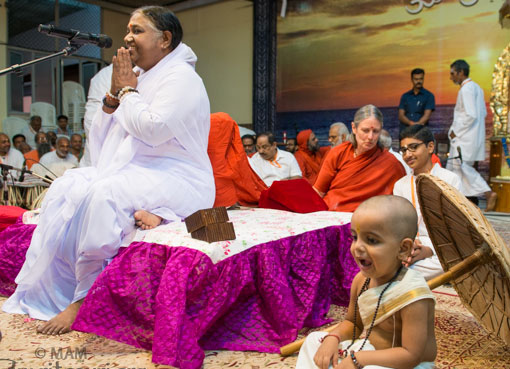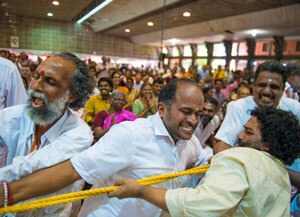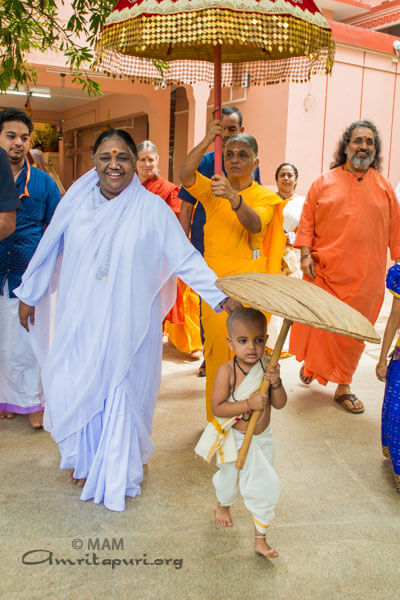 4 Sept 2017 — Amritapuri Ashram
4 Sept 2017 — Amritapuri Ashram
Amma’s Message on Thiruvonam
Amma bows down to everyone, who are embodiments of divine love and supreme consciousness.
The festival of Onam brings with it a sweet sankalpa—an ideal whose sweetness and novelty never fade with time. Amma is happy when her children come together here on the occasion of Onam. Onam is a celebration of our native culture, arts and games. It symbolises a passage from the darkness of yesterday into the light of the better times of tomorrow.
Vasudhaiva Kutumbakam is the Indian concept that the whole world is one family. The celebration of Onam is closely aligned with this truth. The earth and the sky, the flowers, birds and animals—all of Nature comes together as one family and participates in this celebration.
What is special about a family? Each member of a family supports and protects all the other members. The entire world is sustained through mutual dependency and nourishment. Just look at Nature. Flowers and fruits grow on plants and trees. Bees make honey. Do they make it only for themselves? No. It is also consumed by birds and other animals. Similarly, trees produce life-sustaining oxygen. In return, birds and animals help the trees and plants to germinate and grow. In this way, all of Nature carries the message of mutual assistance, sharing and cooperation. Our ancestors, who lived in harmony with Nature, were the same. Even as they protected their harvest, they left some behind for the birds. They did not destroy all the pests and upset the harmony of Nature like we do today. All they did was control the pests. Today, environmental protection remains only in our discussions. We rarely put it into practice.
Our life should not be just for ourselves. It should also be for the society and Nature surrounding us. Human beings are a higher form of creation; we should see it as our duty to protect the creatures that are weaker than us.
The story of Mahabali is connected to yajna samskara—the culture of sacrifice. In fact, when the young Vamana walks into Mahabali’scourt, a fire yajna is taking place. A yajna should benefit everyone in the world. It should be done without ego, with an attitude of surrender. Giving charity is an essential component of yajna. Charity is given great importance in Indian culture. Why? Because our ancients knew that it is what we give back that is most important. Onam serves as a reminder of the importance of compassion and sharing.
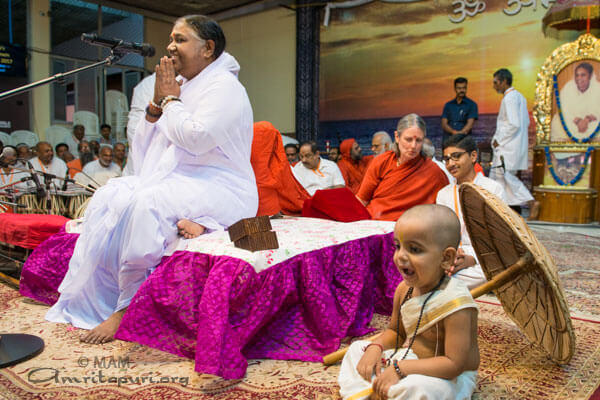
In Amma’s childhood, when rice grains would be brought home from the harvest, before they were stored in the granary, people from the neighbouring houses would be given a part of the harvest. Depending on the size of the family, three kgs to six kgs of rice would be distributed to them. Around 15 houses would receive a share like this. Before the grains would be measured and put in their vessels, Amma’s mother would first put a little in each vessel with her hands. Only then would she add the measured rice. Regardless, each measuring scoop was still filled to the brim. This was to make sure that the neighbours always received more—not less. In today’s world, this whole mentality of giving has changed. People have become more and more selfish. We have to change this attitude.
The festival of Onam and its celebrations give us the message that prosperity, peace and affluence result when ancient spiritual traditions and the modern world go hand in hand. Mahabali was a good ruler who governed the kingdom in accordance with his people’s wishes. Yet, he was also a perfect devotee. Hence, he gave equal importance to the material as well as to the spiritual growth of his people. He did not see spirituality and material life as separate; he gave them equal place. And it was with this outlook that he showed us how to live. As such, even though he was an Asura king, during his golden reign, love, friendship, equality, wealth, prosperity and honesty prevailed.
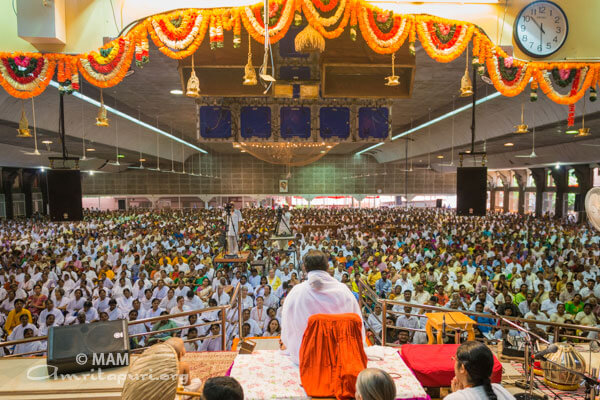
When man goes in search of “the modern,” he tends to forget that it is the “old” truths that serve as its foundation. Spiritual values never perish. They are needed equally in all places, at all times. The world becomes beautiful when we understand this truth and lead a modern life while standing firmly rooted in these ancient values. Spirituality should not be pushed away as “some old way of thinking.” It should be imbibed and practiced in our lives. We should never forget the truth that only if there is old will there be new. During the Independence struggles of different nations, many people sacrificed their lives for their countries. Do we call those people “old-fashioned” and criticise them? The foundation of today’s independence is the sacrifice and adversity faced by those people. When new songs and bhajans are composed, do we ever put down the old tunes? The foundation of today is yesterday.
In the same way, a nation’s native culture lies in the values that bind it together; it is these that are the reason for its growth and progress. Hence, without a spiritual outlook, material life will always be filled with conflict and agitation. Such a society will not be prosperous, peaceful or united.
Both God and demons are within man’s mind. When we unleash desires without any control, when we live only to satisfy our selfish victories and wants, man becomes an asura—a demon. But man is capable of progressing in the opposite direction as well—towards God. Although Mahabali was an Asura king, he possessed many divine qualities such as a charitable nature, kindness and compassion. Hence, even though he was born into the Asura clan, Mahabali was divine. It was his inherent divine qualities that made that period a time of peace, unity and equality.
Complete contentment is the highest mental state. This state is what we see in Mahabali. “I have attained all I need. I have seen all, experienced all. I have no likes or dislikes left. I have only one goal: “To return to my Self; to merge into God.” The constant flow of this thought, with deep intensity, is real contentment. This is what we see in Mahabali.
Today we see a human race that is madly running after material pleasure, name and fame—even when it has one foot in the grave. To those who live like this, wreaking havoc in their own lives as well as those of others, Mahabali’s life is the ultimate message.
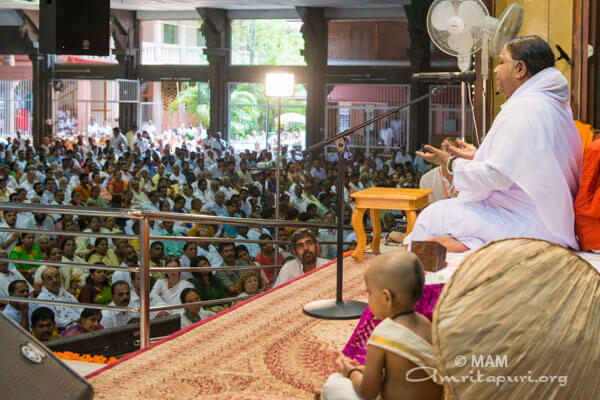
Today’s Onam celebration has greatly diverged from its original fundamental values. Many people use this as an occasion to party with alcohol, eat meat and watch cheap programmes perverting our culture. Even our iconic Mahabali is now depicted as a comic potbellied character, holding a palm-leaf umbrella.
In reality, the annual return of Mahabali should symbolize our return to the values of Onam. Onam becomes meaningful only when love, friendship, sharing, love of Nature and other values overflow in our lives. Today, the God within us is in the form of Vamana—a dwarf. Through our innocence, sacrifice, austerity and compassion, this dwarf should grow into the giant Trivikrama. We should grow to see God in all the three worlds, and love and serve everyone and everything. Only then will our Onam become the real Onam.
May grace bless my children to have a heart filled with selflessness!

